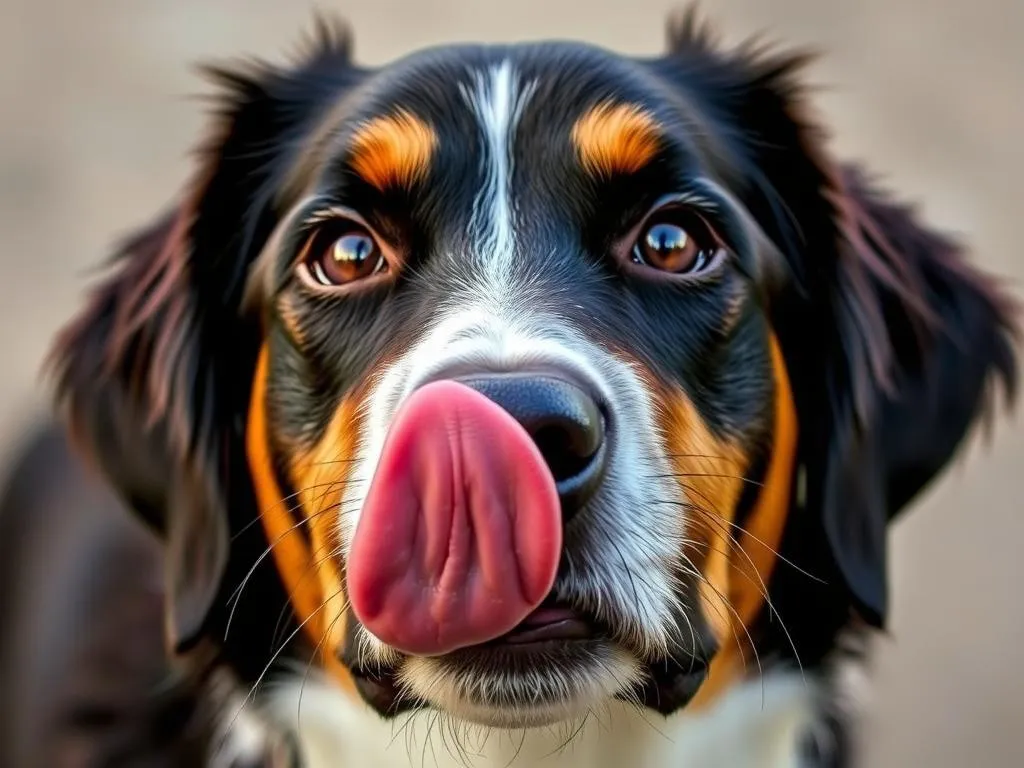
Introduction
Understanding dog behavior is crucial for any responsible pet owner. Dogs communicate in various ways, from barking and growling to more subtle actions like body language and facial expressions. Recognizing these signs can help you determine how your dog is feeling and whether they might be experiencing discomfort or health issues.
One particular behavior that often puzzles dog owners is lip licking. In this article, we will explore why dogs lick their lips, the various reasons behind this behavior, and how understanding it can enhance your dog’s health care.
Understanding Lip Licking in Dogs
Definition of Lip Licking
Lip licking in dogs refers to the action of a dog repeatedly licking its lips. This can be a quick flick of the tongue or a more prolonged activity. While it may seem benign, the context in which a dog licks its lips is crucial to understanding its meaning.
Common Contexts for Lip Licking
Dogs may lick their lips for several reasons, often linked to specific situations. Here are some common triggers:
- Before Eating: Many dogs lick their lips in anticipation of food, signaling their excitement or hunger.
- After Eating: Some dogs lick their lips after finishing their meal as a way to clean themselves.
- During Stress: Lip licking can also be a sign of anxiety or stress, especially if the dog is in an uncomfortable situation.
- In Response to Discomfort: Dogs may lick their lips when they feel nauseous or have dental issues.
Understanding these contexts helps differentiate between normal behavior and potential health problems.
Reasons Why Dogs Lick Their Lips
Natural Instincts
Licking is a natural instinct for dogs, inherited from their ancestors. Wild canids often lick their lips after eating to clean themselves and to signal to other pack members that they have finished their meal. This instinctual behavior carries over into domesticated dogs, even in non-threatening environments.
Hunger or Anticipation
One of the most common reasons for lip licking is hunger or the anticipation of food. When your dog sees you preparing their meal or smells their favorite treat, they may lick their lips in excitement. This is a perfectly normal behavior and indicates that your dog is looking forward to their next meal.
Stress and Anxiety
Another significant reason for lip licking is stress or anxiety. Dogs may lick their lips when they feel threatened, anxious, or uncomfortable. This behavior can be a coping mechanism, signaling their distress. Common signs of anxiety in dogs include:
- Whining or barking
- Pacing
- Excessive shedding
- Destructive behavior
If your dog frequently licks their lips in stressful situations, it may be essential to address their anxiety to improve their overall well-being.
Health Issues
Excessive lip licking can also indicate underlying health problems. Some of the common medical issues linked to lip licking include:
- Nausea: Dogs that feel nauseous may lick their lips as a response. This could be due to dietary indiscretion, motion sickness, or other gastrointestinal issues.
- Dental Problems: Conditions like periodontal disease or oral infections can lead to lip licking as dogs attempt to alleviate discomfort.
- Allergies: Allergies to food, environmental factors, or flea bites can cause skin irritation and discomfort, leading to increased lip licking.
If you notice frequent or excessive lip licking, it could signal a medical issue that requires attention.
When to Be Concerned
Normal vs. Abnormal Licking
Understanding the difference between normal and abnormal lip licking is crucial. While occasional licking, especially before or after meals, is completely normal, excessive or persistent licking may indicate a problem.
Signs of Underlying Health Problems
Look for additional signs that may accompany lip licking, such as:
- Vomiting
- Excessive drooling
- Behavioral changes (aggression, withdrawal)
- Loss of appetite
If your dog exhibits any of these symptoms alongside lip licking, it may be time to consult a veterinarian.
When to Consult a Veterinarian
If you notice your dog licking their lips excessively or if the behavior is accompanied by other concerning symptoms, it’s essential to consult a veterinarian. They can perform a thorough examination to determine the cause of the lip licking and recommend appropriate treatment.
How to Address Lip Licking in Dogs
Behavior Modification Techniques
If lip licking is linked to anxiety or stress, consider implementing behavior modification techniques. Here are some strategies:
- Desensitization: Gradually expose your dog to the situations that trigger their anxiety while rewarding calm behavior.
- Training: Teach your dog commands like “stay” or “leave it” to help them manage their reactions in stressful situations.
- Safe Spaces: Create a safe and comfortable space for your dog where they can retreat when feeling anxious.
Dietary Adjustments
If lip licking stems from dietary issues, consider evaluating your dog’s diet. Some tips include:
- High-Quality Food: Ensure your dog is eating a balanced, nutritious diet that meets their specific needs.
- Food Sensitivities: Monitor for any food sensitivities that could lead to gastrointestinal discomfort.
- Regular Schedule: Feed your dog at consistent times to establish a routine and reduce anxiety around mealtime.
Veterinary Interventions
In cases where health issues are identified, veterinary interventions may be necessary. Possible treatments include:
- Medication: If anxiety or nausea is diagnosed, your veterinarian may prescribe medication to help manage your dog’s symptoms.
- Dental Care: Regular dental check-ups and cleanings can help prevent dental problems that may lead to lip licking.
- Allergy Testing: If allergies are suspected, your veterinarian may recommend allergy testing to identify triggers.
Preventative Health Care for Dogs
Regular Veterinary Check-ups
Routine veterinary check-ups are essential for early detection of health problems. Regular exams can help identify issues before they become serious, ensuring your dog remains healthy.
Proper Nutrition
Selecting the right diet for your dog is vital in supporting overall health. A balanced diet can help prevent issues like nausea and digestive problems, which can lead to lip licking.
Stress Management Techniques
Implementing stress management techniques can help reduce anxiety in dogs. Consider the following:
- Exercise: Regular physical activity helps burn off excess energy and reduces anxiety.
- Mental Stimulation: Engage your dog with puzzle toys or training exercises to keep their mind active.
- Calm Environment: Create a peaceful home environment, free from loud noises or disruptions that may stress your dog.
Conclusion
In summary, understanding why dogs lick their lips is essential for effective dog health care. Lip licking can indicate a range of behaviors, from natural instincts and anticipation of food to signs of stress or health issues. By paying close attention to your dog’s behavior and recognizing the context in which lip licking occurs, you can take proactive steps to ensure their well-being.
Monitoring your dog’s lip licking habits and consulting with a veterinarian when necessary can lead to better health outcomes and a happier pet. As a dog owner, your attentiveness and responsiveness play a crucial role in your furry friend’s health and happiness.
FAQs
Common Questions About Lip Licking
Why does my dog lick their lips excessively?
Excessive lip licking can be a sign of anxiety, nausea, or other health issues. If the behavior is persistent, consult your veterinarian.
Is lip licking normal after eating?
Yes, many dogs lick their lips after meals as a way to clean themselves. This behavior is typically normal.
What should I do if my dog licks their lips and shows signs of distress?
If your dog is licking their lips and displaying other signs of distress, such as vomiting or behavioral changes, consult your veterinarian for a thorough evaluation.
Expert Opinions
Veterinarians and pet behaviorists emphasize that while occasional lip licking is normal, excessive licking should be addressed. They recommend observing your dog’s behavior closely and consulting professionals when necessary to ensure your pet’s health and well-being.









